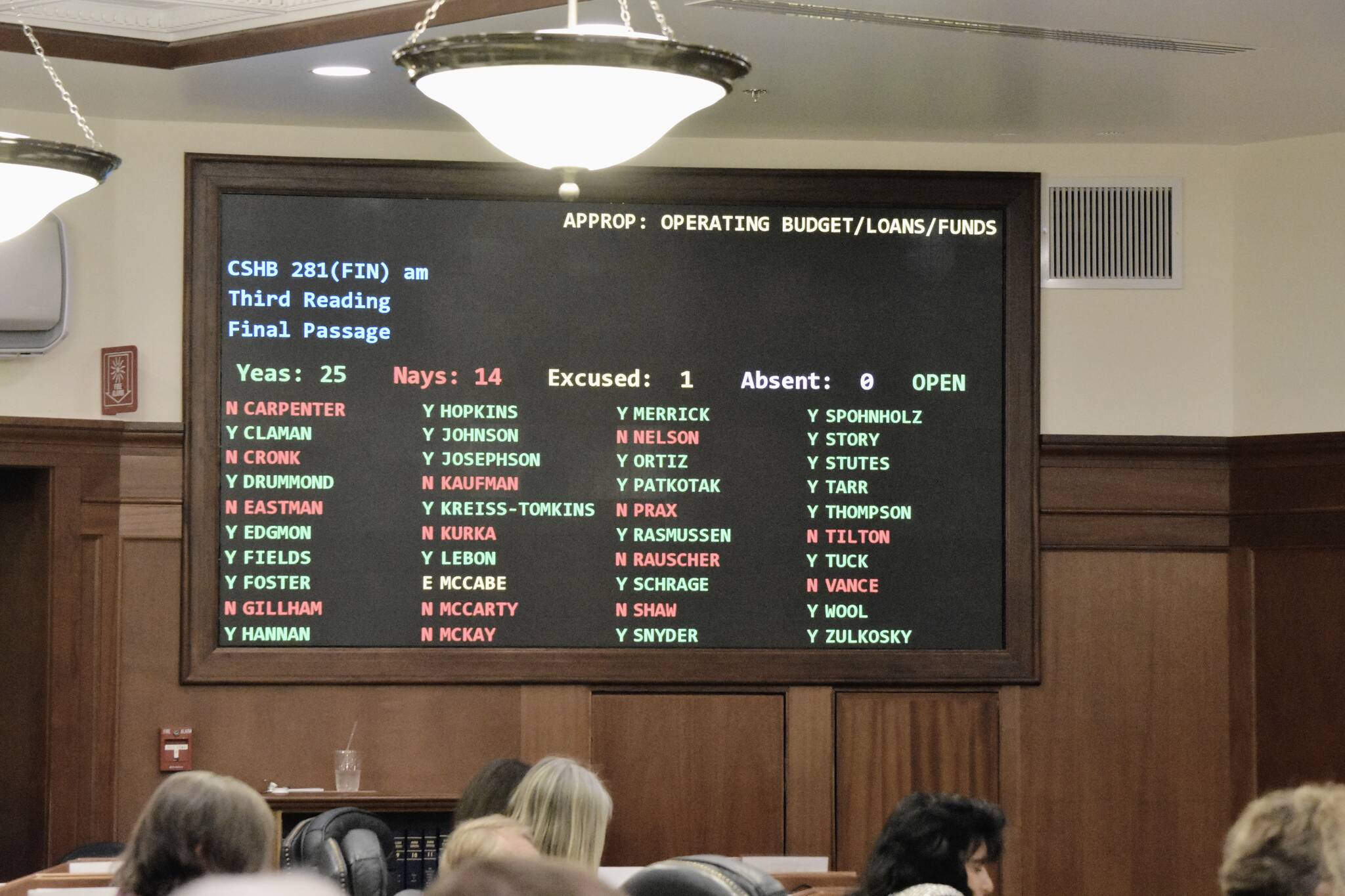The Alaska House of Representatives voted to approve the state’s operating and mental health budgets Saturday but failed to achieve other crucial votes with a high vote threshold.
House members voted 25-14, with one excused absence, in favor of the budget. But votes to enact a bill’s effective date clause require a two-thirds majority vote which in the House is 27 members. Most of the affirmative votes came from members of the majority coalition, who were joined by House Republican minority members Reps. DeLena Johnson, R-Palmer; Bart LeBon, R-Fairbanks and Steve Thompson, R-Fairbanks; and also Rep. Sara Rasmussen, R-Anchorage, who’s not a member of a caucus.
The proposed budget spends roughly $4.3 billion in state funds and includes $1.2 billion to forward fund the state’s education budget for two years and pays a Permanent Fund Dividend of roughly $1,200 and a one-time energy relief check of $1,300 to be paid at the same time.
Speaking to the floor Saturday, House Finance Committee Co-chair Neal Foster, D-Nome, said the budget was one of the most diverse he’s seen, and contained items important to all members’ constituencies.
“It won’t make everyone happy but I think most of us can find something,” Foster said.
The vote in the House is just one part of the state’s budget process and the budget bill will now go to the Alaska State Senate, where lawmakers have been drafting the state’s capital budget. Budget bills are traditionally combined into a single bill and negotiated in a committee process before a final vote in both bodies.
Without an effective date clause laws go into effect 90 days after their passage, but the state’s fiscal year begins on July 1. House members failed to achieve the effective date clause last year too, leading to fears of a government shutdown when Gov. Mike Dunleavy argued it would be unconstitutional for him to sign a budget where one chamber of the Legislature hadn’t passed the effective date clause.
[A Q&A with Gov. Mike Dunleavy]
House members passed an effective date clause on June 29, 2021, narrowly avoiding a state government shutdown.
On Saturday, House members also failed to achieve the vote to reverse a critical state accounting provision known as “the sweep,” which has an even higher vote threshold of three-quarters in both bodies.
Several state accounts are automatically emptied — or swept — at the end of each fiscal year and moved into the state’s Constitutional Budget Reserve. Without a vote to reverse that transfer, several state programs will remain unfunded. The vote to reverse the sweep has become a battleground in recent years.
Members voted 24-15 to reverse the sweep along much the same lines as the budget vote. Johnson and Rasmussen voted against reversing the sweep, but for the budget, and Rep. James Kaufman, R-Anchorage, voted against the budget but for reversing the sweep.
Debate over the mental health budget was shorter and less contentious than the operating budget, and passed 27-12.
When Dunleavy came into office his administration added the Higher Education Investment Fund and the Power Cost Equalization Fund to the list of sweepable funds, leading to lawsuits against the state. In August 2021 an Anchorage Superior Court ruled against the Dunleavy administration in regards to the PCE fund but in February a different case over the higher education fund was decided in favor of the administration. That decision was appealed by the plaintiffs.
Without the reverse sweep, programs under the Higher Education Investment Fund will remain underfunded. Programs under the higher education fund include the Alaska Performance Scholarships and the Washington, Wyoming, Alaska, Montana, Idaho Program at the University of Washington School of Medicine.
On the floor House Minority Leader Rep. Cathy Tilton, R-Wasilla, criticized the budget as written saying it failed to pay a statutory Permanent Fund Dividend while increasing funding to state services.
The $1.2 billion in forward funding for the state’s education budget was, “a nice thing to have,” Tilton said, “but not a necessary thing to have.”
Tilton criticized the appropriation for the PFD saying the amount had been arbitrarily chosen by a few lawmakers rather than being based on a consistent formula.
“What I think is missing is the dollars to the people of the state of Alaska,” Tilton said. “The people of the state have not received a full PFD for six years, there’s no reason why we’re not paying those stat dividends.”
Lawmakers should not be surprised, Tilton said, if Alaskans “revolt” and vote for a constitutional convention, and invoked Thomas Jefferson’s quote, “the tree of liberty must be refreshed from time to time with the blood of patriots and tyrants.”
Several members of the Republican minority expressed frustration with the budget process over the past several years, and said the size of the state’s government continued to grow while dividend amounts continued to fall.
“On a very large scale what this budget does is takes away choice from thousands of Alaskans,” said Rep. Mike Prax, R-North Pole.
Saturday’s session was at times contentious, with several motions from Rep. David Eastman, R-Wasilla, questioning the constitutionality of the reverse sweep and attempts to move the bill back to second reading for the purposes of re-voting on certain amendments.
Reconsideration votes were taken on the budget, the reverse sweep and the effective date clause, but all those re-votes ended with the same results.
• Contact reporter Peter Segall at psegall@juneauempire.com. Follow him on Twitter at @SegallJnuEmpire.

